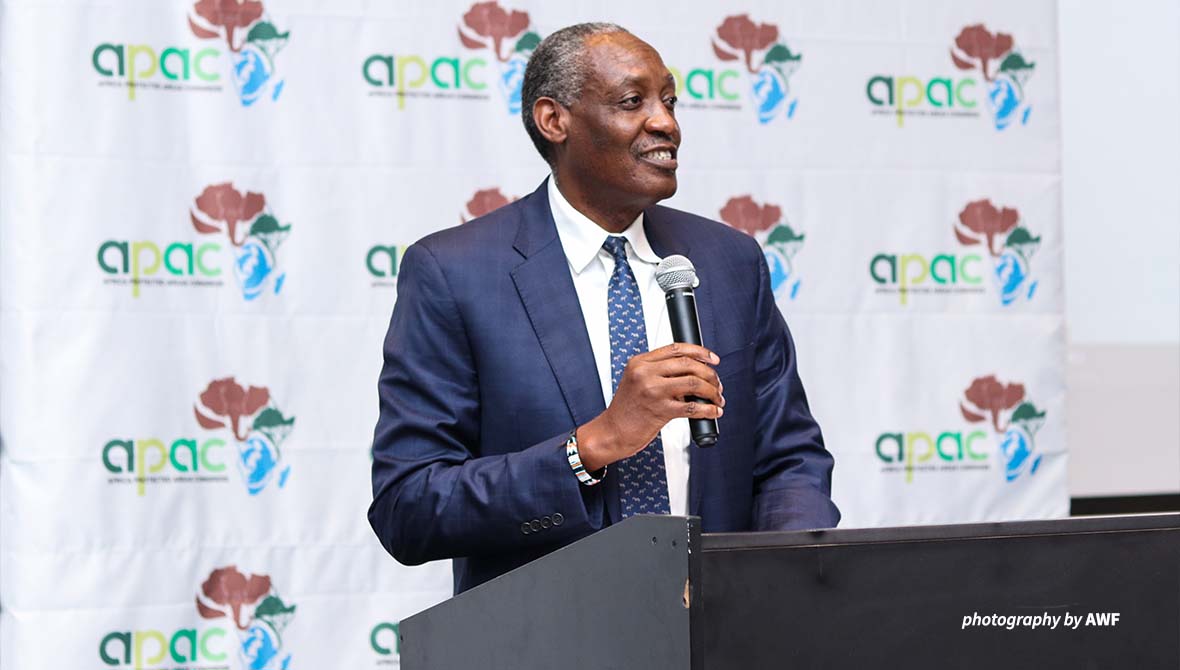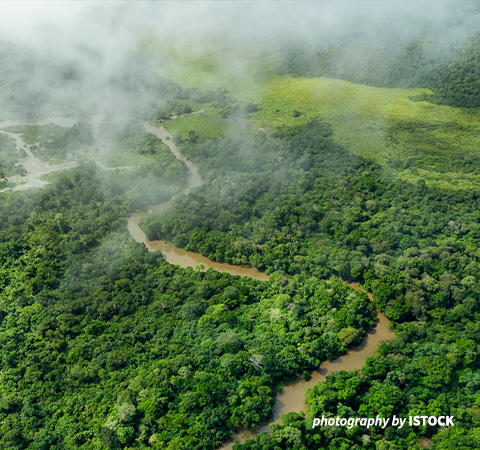2023: The Year of Action

AWF CEO Kaddu Sebunya speaking at the Africa Protected Areas Congress in Kigali, Rwanda
2022 has offered numerous opportunities for the world and our leaders to recalibrate their commitments toward an environmentally positive outlook. It is important to note that for the first time, African participation was at its foremost, whether playing host or participating—a huge improvement from previous years.
The continent played host to two major conferences that provided the platform for setting an African agenda. The first was the inaugural African Protected Area Congress in Kigali, Rwanda. Seeding participation from all 54 African countries, this congress birthed the Kigali Call to Action, which outlined a clear roadmap for the continent to combat environmental challenges.
The Kigali Call to Action was soon after wholeheartedly adopted by African environmental ministers in Senegal and by the African negotiators at the Libreville Africa Climate Week. It was initiatives such as these that lay the foundation for the next groundbreaking conference in Egypt—the 27th Conference of the Parties, UNFCCC COP27. Dubbed the “African COP,” the hope was to see Africa’s priorities well-addressed and develop a clear roadmap to ensure that the loss and damage fund is established and rolled out by 2024.
These efforts of unity and the many more witnessed at the subsequent summits that took place at the end of 2022—the Convention on International Trade in Endangered Species of Wild Fauna and Flora (CITES) COP19; the Convention on Biological Diversity (CBD) COP15; and the U.S.-Africa Leaders Summit—are proof enough that we can make huge strides if we unite and focus on the goal.
It is with this optimism that I urge us all to commence this new year.
We can all bear witness to the ravaging effects of climate change that directly result from our broken relationship with nature. Ranging from devastating drought in the horn of Africa to deadly floods in West and Southern Africa, the writing is clearly on the wall. We must now see significant action from governments across the world this new year.
And Africa has more than shown that it is up to the task. Home to 30 percent of the world’s biodiversity, one-third of the world’s freshwater, and vast forests that absorb massive quantities of CO2, Africa’s biodiversity is the key to combating climate change on a global scale. The Congo Basin, for example, spans six countries in Central Africa and is considered the second lung of the planet, hence critical to maintaining global climate stability.
Unmistakably, the decisions African leaders are making today on economic growth, politics, population, food security, sources of energy, and urbanization will determine the space left for 30% of global biodiversity.
For the health of the Earth, Africa must sustain its biodiversity, but at the same time, Africans must develop and negotiate the boundaries between animals and people.
Although Africa urgently needs growth, it also has the opportunity to advance sustainably and industrialize using renewable energy. Africa has always prioritized wildlife protection through conservation, often evicting people from their land. In many nations, wildlife populations have grown, but so has conflict between humans and wildlife.
My participation at the U.S.-Africa Leaders Summit towards the end of 2022 gave me hope because I have seen first-hand the power of the U.S. government and African governments working together. We all know how critical U.S. leadership is to the success of biodiversity restoration.

One of Africa’s most critical ecosystems, the Congo Basin rainforest spans 500 million acres.
I am aware of the strides being discussed in the U.S. Congress— like the African Youth Conservation and Climate Corps Act. This act aims to identify and meet the capacity needs of African countries' conservation, natural resources, and energy sectors through job creation and institutional development.
I am a witness to what we have accomplished together with the Millennium Challenge Corporation (MCC) in Niger—made possible by MCC’s impact-oriented program design and the advantages of strategic collaborations. If the U.S. Government extends MCC’s country-led development model through new climate and conservation compacts, this will play a significant role in stepping up conservation efforts.
At the beginning of the poaching and trafficking crisis, we partnered with the State Department’s Bureau of International Narcotics and Law Enforcement (INL) to support African countries in combating poaching on the ground and the trafficking of wildlife.
AWF’s approach, working alongside African government agencies to strengthen capacities for law enforcement at key ports and borders and going up the chain to bring awareness and capacity to the judiciary, has enhanced in-country, regional, and continental-level enforcement.
Undeniably, strong leadership can determine the path that Africa takes.
We are at an interval when Africa is now making real choices about how and where development will occur.
Which areas of Africa should be protected, and which ones will be traded off for development?
What is the role of wildlife and wild lands in Africa’s development?
The question is whether Africa will follow the western model or embark on a novel trajectory; this will have a disproportionately substantial impact on our future here today.
The discussions we have had before and in the 2022 conferences have paved the way for action; the roadmaps now exist. In 2023, it is now time for us to put our money where our mouth is and walk the talk.
Henry Ford once said, “Coming together is a beginning, staying together is progress, and working together is success.”
I therefore look forward to hitting the ground running and working with the rest of Africa and the world in nursing our planet back to health.
We can do this!
Happy New Year, folks!